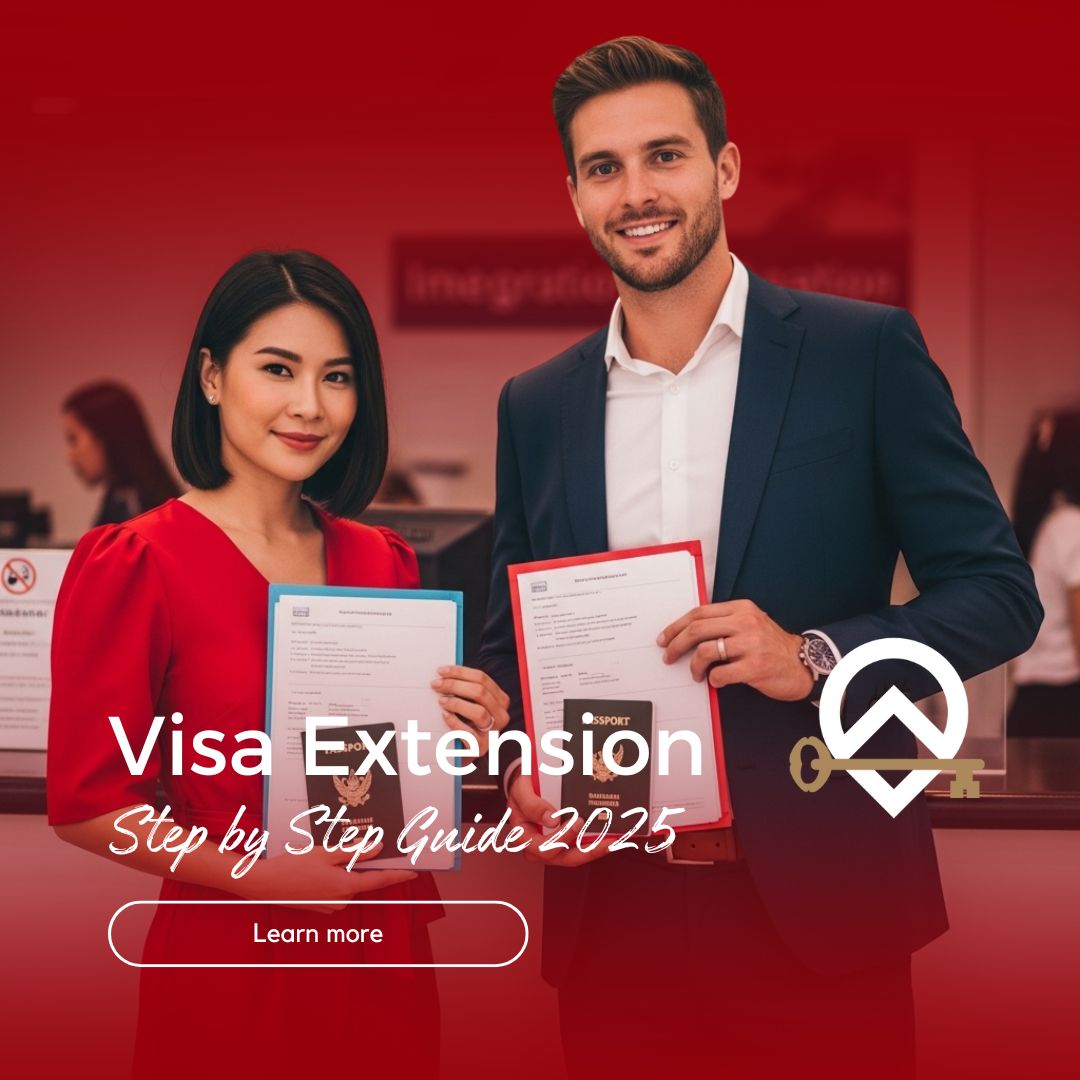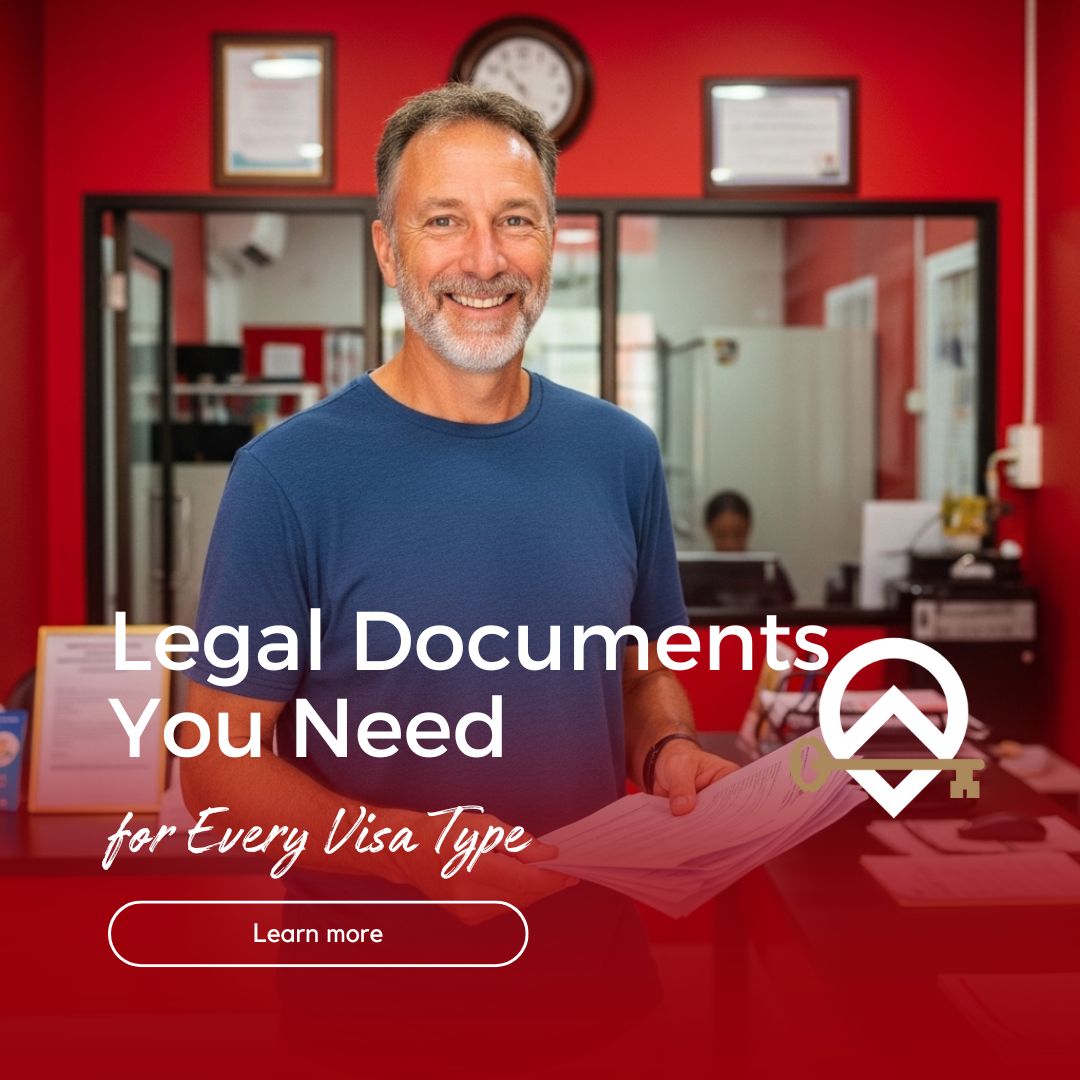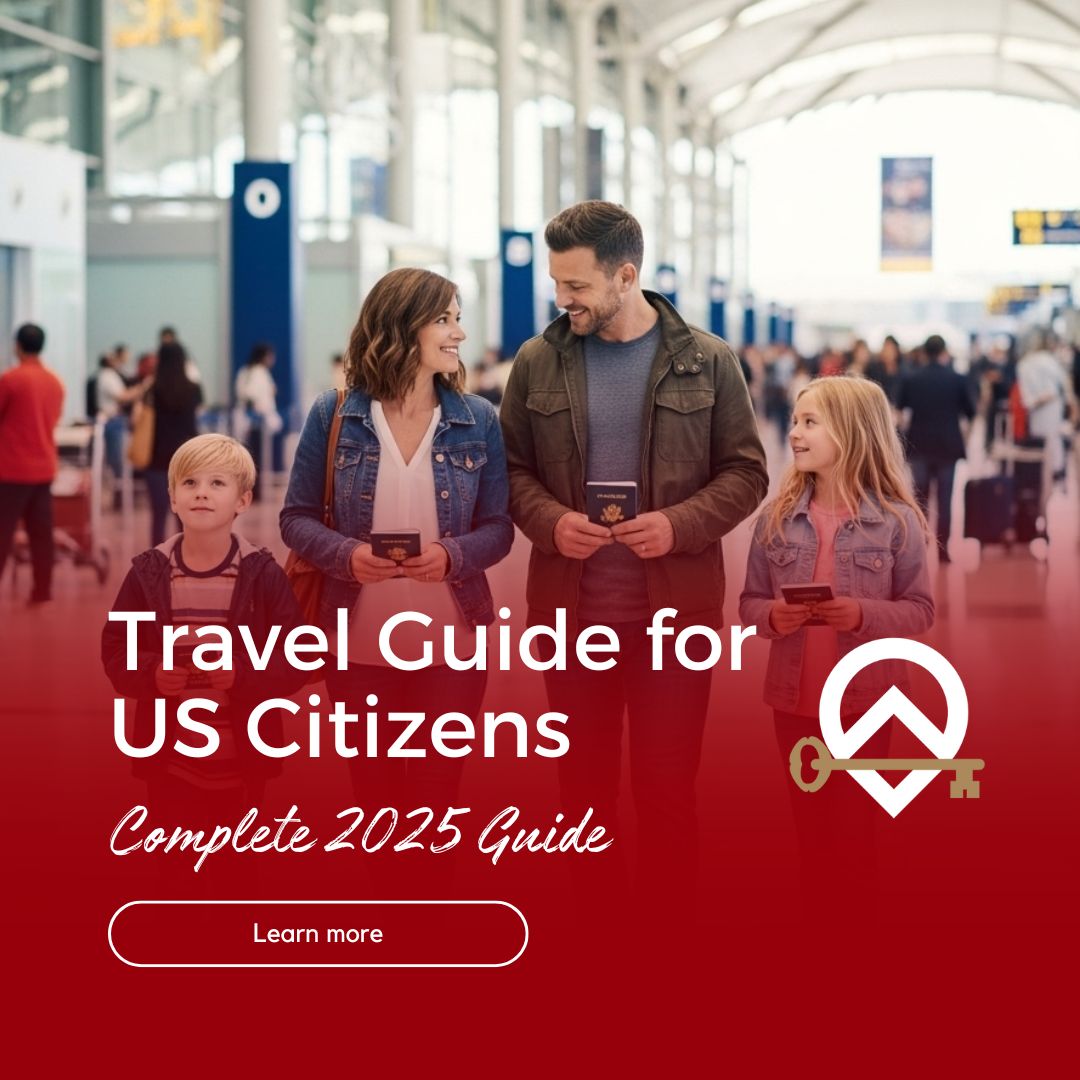Planning to stay longer in Thailand than your current visa allows? You're definitely not alone! Thailand's incredible culture, stunning landscapes, and affordable lifestyle make it hard to leave when your visa is about to expire. The good news is that yes, you can extend most types of Thailand visas, and the process is more straightforward than many travelers think.
Whether you're on a tourist visa, visa exemption, or other types of visas, this guide will walk you through everything you need to know about extending your stay in the Land of Smiles.
Table of Contents
- Types of Thailand Visas and Extension Possibilities
- Tourist Visa Extension Process
- Required Documents and Fees
- Step-by-Step Application Process
- Where to Apply and Office Information
- Important Tips and Alternative Options
Types of Thailand Visas and Extension Possibilities
Understanding what type of visa you currently hold is crucial for determining your extension options. Thailand offers several visa categories, each with different extension rules and possibilities.
Tourist Visa Extensions
Tourist visas come in two types: a Single-Entry Tourist Visa, which allows up to a 60-day stay, and a Multiple-Entry Tourist Visa, valid for six months with a 60-day stay limit per visit. Generally, tourist visas allow a stay of 60 days, and can typically be extended once for an additional 30 days at an immigration office. This means you can potentially stay up to 90 days total with a single-entry tourist visa.
Visa Exemption Extensions
Travelers from visa-exempt countries are typically granted a 30-day stay upon arrival. The visa exemption stamp can also be extended for an additional 30 days, giving you a total of 60 days in Thailand. This is particularly useful for spontaneous travelers who didn't plan for a longer stay initially.
Visa on Arrival Extensions
Visa on arrival is only available for residents of certain countries and typically grants a 15-day stay. These can also be extended for an additional 30 days, though the process is identical to other tourist visa extensions.
Other Visa Types
Non-immigrant visas (for business, education, retirement, etc.) have different extension rules and requirements. If you want to stay longer than 90 days, consider applying for other visa types like the Non-Immigrant Visa (B) for business, Education Visa (ED) for study, or the Retirement Visa if eligible. These require more documentation and have specific financial requirements.
Long-term Stay Options
For those planning extended stays, Thailand offers various long-term visa options. The Special Tourist Visa permits long-term stays in Thailand and was introduced to support tourism recovery. Marriage visas require a marriage certificate, financial proof (minimum monthly income of 40,000 baht or USD 1178), and other necessary documents as determined by immigration authorities.
Tourist Visa Extension Process
The tourist visa extension process is standardized across Thailand, making it relatively straightforward once you understand the requirements. Here's what you need to know about extending your tourist stay.
Extension Duration and Limitations
Most tourist visas and visa exemptions can be extended for exactly 30 days from your current stamp's expiration date. This is a one-time extension, meaning you cannot extend again after receiving the 30-day extension. The extension period starts from when your current permission to stay expires, not from the day you apply.
When to Apply
You can apply for your extension at any time during your current authorized stay, but it's wise to apply at least a few days before your current stamp expires. Don't wait until the last minute, as processing can take several hours, and you don't want to risk overstaying your visa, which can result in fines and future entry problems.
Extension Fees
The standard fee for a 30-day tourist visa extension is 1,900 Thai Baht, payable only in cash. This fee is the same regardless of which immigration office you visit and is non-refundable even if your extension is denied (though denials are rare for legitimate tourist extensions).
Processing Time
Most extensions are processed the same day, typically taking 1-4 hours depending on how busy the immigration office is. During peak tourist seasons or at popular tourist destinations, processing times may be longer, so plan to spend most of the day at the immigration office.
Success Rate
Extension approvals for legitimate tourists are generally very high. As long as you have proper documentation, haven't overstayed previous visas, and can demonstrate you're a genuine tourist, your extension should be approved without issues.
Required Documents and Fees
Having the correct documents prepared is essential for a smooth extension process. Missing or incorrect documentation is the most common reason for delays or complications.
Essential Documents
Your passport must have at least 6 months of validity remaining and contain your current valid visa or entry stamp. You'll need to complete a Visa Extension Form (TM.7), which is available at immigration offices or can be downloaded from the Thai Immigration Bureau website.
Two recent passport-sized photographs (4cm x 6cm) are required. These should be taken within the last 6 months and show your face clearly against a white background. Photo shops near immigration offices typically offer this service for 100-200 baht.
Proof of Accommodation
You must provide evidence of where you'll be staying during your extended visit. This can be hotel booking confirmations, rental agreements, or a letter from your host if staying with friends or family. The accommodation proof should cover at least part of your extension period.
Financial Requirements
While not always strictly enforced for tourist extensions, you should be prepared to show proof of sufficient funds for your extended stay. This typically means having access to 10,000-20,000 baht per person, which can be demonstrated through cash, bank statements, or ATM receipts.
TM.30 Form
Your accommodation provider should have filed a TM.30 form reporting your stay to immigration. Some offices may request proof of this filing, so check with your hotel or landlord that this has been completed.
Additional Considerations
Bring photocopies of all documents, as immigration offices often require these. Some offices provide copying services, but it's more efficient to come prepared. Also, bring a pen for filling out forms, as these aren't always available at immigration offices.
Step-by-Step Application Process
The visa extension application process follows a standard procedure across all Thai immigration offices. Here's your complete step-by-step guide:
Step 1: Prepare Your Documents
Before leaving your accommodation, ensure you have all required documents ready and properly organized. Make copies of everything and bring extra passport photos. Double-check that your passport has sufficient validity and blank pages for the extension stamp.
Step 2: Arrive Early at Immigration
Get to the immigration office early, ideally by 8:30 AM when they open. This helps you avoid long queues that typically form later in the day. Dress appropriately (no shorts, tank tops, or flip-flops) and bring a book or entertainment, as you may need to wait several hours.
Step 3: Take a Queue Number
Most immigration offices use a queue number system. Take your number and wait for it to be called. Some offices have separate counters for different visa types, so make sure you're in the correct queue for tourist visa extensions.
Step 4: Submit Your Application
When your number is called, present all your documents to the immigration officer. They will review your application, ask basic questions about your travel plans, and collect the 1,900 baht fee. Be honest about your tourist activities and reason for extending your stay.
Step 5: Wait for Processing
After submitting your application, you'll need to wait for processing. Some offices will ask you to wait in a specific area, while others may give you a receipt and allow you to leave briefly. Stay within the vicinity of the office in case they need additional information.
Step 6: Receive Your Extension
Once processed, you'll be called back to receive your passport with the new extension stamp. Carefully check the dates on your new stamp before leaving the office to ensure they're correct. Your new stamp will show the extended stay period.
Common Questions During Processing
Immigration officers may ask about your travel plans, where you're staying, how you're supporting yourself financially, and why you want to extend your stay. Keep answers simple and honest – you're a tourist who wants to see more of Thailand.
Where to Apply and Office Information
Thailand has immigration offices in major cities and tourist areas throughout the country. Knowing where to go and what to expect will help you plan your extension application effectively.
Major Immigration Offices
Bangkok's main immigration office is located on Chaeng Wattana Road and is the largest facility in the country. It's modern, efficient, and handles thousands of applications daily. The office has good facilities including air conditioning, seating areas, and nearby restaurants.
Phuket's immigration office is located in Phuket Town and serves the entire island. It's smaller than Bangkok's office but generally less crowded. Chiang Mai's office is located near the airport and handles extensions for northern Thailand visitors.
Pattaya has its own immigration office on Jomtien Beach Road, serving the eastern seaboard region. This office is popular with expats and can be quite busy, especially during tourist season.
Operating Hours and Schedule
Most immigration offices operate Monday-Friday from 09:00 - 16:00, with a lunch break typically from 12:00-13:00. Some offices may have slightly different hours, so it's best to check specific office schedules before visiting.
Best Times to Visit
Tuesday through Thursday are generally the least busy days at immigration offices. Mondays and Fridays tend to be crowded, as are the days before and after public holidays. Arriving early in the morning (8:30-9:00 AM) gives you the best chance of being processed quickly.
Special Considerations
Some tourist areas have immigration offices that operate extended hours or weekend service during peak seasons. Always check current operating schedules, as these can change due to holidays or special circumstances.
Important 2025 Update
Starting from May 1, 2025, the Immigration Bureau of Thailand requires all foreign nationals entering or departing the Kingdom of Thailand to fill out their personal and travel information in a digital system called the Thailand Digital Arrival Card (TDAC). This will affect future entries after visa runs or leaving and returning to Thailand.
Important Tips and Alternative Options
Successfully extending your Thailand visa requires more than just following the basic procedures. Here are essential tips and alternative strategies to consider:
Planning and Preparation Tips
Start gathering your documents at least a week before you plan to apply. This gives you time to obtain any missing documents or resolve issues with your accommodation's TM.30 filing. Keep digital copies of all your documents as backup.
Consider your long-term plans before applying for an extension. If you're planning to stay much longer than the 30-day extension allows, research other visa options or plan for a visa run to a neighboring country.
Dress Code and Behavior
Immigration offices have strict dress codes. Wear long pants, closed-toe shoes, and shirts that cover your shoulders. Avoid any clothing with holes, offensive graphics, or that's too revealing. Being polite and patient with immigration officers will make the process smoother.
Alternative Options for Longer Stays
If you need to stay longer than the single 30-day extension allows, consider doing a "visa run" to a neighboring country like Malaysia, Cambodia, or Laos. This involves exiting Thailand and re-entering for a new visa exemption or tourist visa.
For significantly longer stays, consider applying for a proper tourist visa at a Thai consulate in a neighboring country. This can provide 60 days with the possibility of another 30-day extension, giving you up to 90 days total.
What to Avoid
Never overstay your visa, as this results in 500 baht per day fines, potential detention, and future entry restrictions. Don't use unofficial visa services that promise "guaranteed" extensions through unofficial channels – always use official immigration offices.
Avoid applying for an extension on the last day of your current stamp, as processing delays could result in an overstay. Don't lie to immigration officers about your plans or activities in Thailand.
Money-Saving Tips
While visa agents charge 3,000-5,000 baht for extension services, doing it yourself costs only the 1,900 baht government fee. The process is straightforward enough that most travelers can handle it independently.
Bring exact change or small bills for the extension fee, as immigration offices may not have change for large denominations. Some offices have ATMs nearby, but they may charge foreign transaction fees.
Record Keeping
Keep copies of all your visa documents, extension applications, and receipts. Take photos of your passport stamps as backup. This documentation can be helpful for future visa applications or if you encounter issues during your stay.
Consider keeping a travel journal with dates of entry, extensions, and exits from Thailand. This can be useful for tracking your stay history and planning future visits within Thailand's immigration rules.
Remember that visa policies can change, and immigration officers have some discretion in their decisions. While extensions are generally granted for legitimate tourist purposes, having a clear travel plan, adequate funds, and proper documentation will maximize your chances of success. With proper preparation and the right approach, extending your Thailand visa is a manageable process that allows you to enjoy more time in this incredible country.





